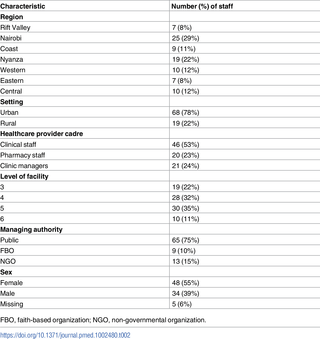PLOS Medicine ( IF 10.5 ) Pub Date : 2017-12-27 , DOI: 10.1371/journal.pmed.1002480 Kipruto Chesang 1 , Sureyya Hornston 2 , Odylia Muhenje 1 , Teresa Saliku 3 , Joy Mirjahangir 4 , Amanda Viitanen 4 , Helgar Musyoki 5 , Christine Awuor 5 , George Githuka 5 , Naomi Bock 2

|
Background
The burden of sexually transmitted infections (STIs) has been increasing in Kenya, as is the case elsewhere in sub-Saharan Africa, while measures for control and prevention are weak. The objectives of this study were to (1) describe healthcare provider (HCP) knowledge and practices, (2) explore HCP attitudes and beliefs, (3) identify structural and environmental factors affecting STI management, and (4) seek recommendations to improve the STI program in Kenya.
Methods and findings
Using individual in-depth interviews (IDIs), data were obtained from 87 HCPs working in 21 high-volume comprehensive HIV care centers (CCCs) in 7 of Kenya’s 8 regions. Transcript coding was performed through an inductive and iterative process, and the data were analyzed using NVivo 10.0. Overall, HCPs were knowledgeable about STIs, saw STIs as a priority, reported high STI co-infection amongst people living with HIV (PLHIV), and believed STIs in PLHIV facilitate HIV transmission. Most used the syndromic approach for STI management. Condoms and counseling were available in most of the clinics. HCPs believed that having an STI increased stigma in the community, that there was STI antimicrobial drug resistance, and that STIs were not prioritized by the authorities. HCPs had positive attitudes toward managing STIs, but were uncomfortable discussing sexual issues with patients in general, and profoundly for anal sex. The main barriers to the management of STIs reported were low commitment by higher levels of management, few recent STI-focused trainings, high stigma and low community participation, and STI drug stock-outs. Solutions recommended by HCPs included formulation of new STI policies that would increase access, availability, and quality of STI services; integrated STI/HIV management; improved STI training; increased supervision; standardized reporting; and community involvement in STI prevention. The key limitations of our study were that (1) participant experience and how much of their workload was devoted to managing STIs was not considered, (2) some responses may have been subject to recall and social desirability bias, and (3) patients or clients of STI services were not interviewed, and therefore their inputs were not obtained. While considering these limitations, the number and variety of facilities sampled, the mix of staff cadres interviewed, the use of a standardized instrument, and the consistency of responses add strength to our findings.
Conclusions
This study showed that HCPs understood the challenges of, and solutions for, improving the management of STIs in Kenya. Commitment by higher management, training in the management of STIs, measures for reducing stigma, and introducing new policies of STI management should be considered by health authorities in Kenya.
中文翻译:

医疗保健提供者对肯尼亚艾滋病毒护理机构中性传播感染管理的看法:定性主题分析
背景
与撒哈拉以南非洲其他地区一样,肯尼亚的性传播感染(STI)负担一直在增加,而控制和预防措施却很薄弱。本研究的目的是 (1) 描述医疗保健提供者 (HCP) 的知识和实践,(2) 探索 HCP 的态度和信念,(3) 确定影响性传播感染管理的结构和环境因素,以及 (4) 寻求建议以改善性传播感染管理肯尼亚的 STI 计划。
方法和结果
通过个人深度访谈 (IDI),从在肯尼亚 8 个地区中的 7 个地区的 21 个大容量综合艾滋病毒护理中心 (CCC) 工作的 87 名 HCP 获得了数据。通过归纳和迭代过程进行转录编码,并使用 NVivo 10.0 分析数据。总体而言,卫生保健专业人员对性传播感染很了解,将性传播感染视为优先事项,报告艾滋病毒感染者 (PLHIV) 中性传播感染的比例很高,并相信艾滋病毒携带者中的性传播感染会促进艾滋病毒传播。大多数人使用症状方法进行性传播感染管理。大多数诊所都提供安全套和咨询服务。医护人员认为,性传播感染会增加社区中的耻辱感,存在性传播感染抗菌药物耐药性,而且当局并未优先考虑性传播感染。医护人员对处理性传播感染持积极态度,但与一般患者讨论性问题,尤其是肛交问题,感到不舒服。据报告,性传播感染管理的主要障碍是高层管理人员的承诺程度低、最近很少有针对性传播感染的培训、耻辱感高、社区参与度低以及性传播感染药物缺货。 HCP 推荐的解决方案包括制定新的 STI 政策,以增加 STI 服务的可及性、可用性和质量;综合性传播感染/艾滋病毒管理;改进性传播感染培训;加强监督;标准化报告;以及社区参与性传播感染预防。我们研究的主要局限性在于(1)没有考虑参与者的经历以及他们用于管理性传播感染的工作量,(2)一些反应可能受到回忆和社会期望偏差的影响,以及(3)患者或没有对性传播感染服务的客户进行访谈,因此没有获得他们的意见。 在考虑到这些局限性的同时,抽样设施的数量和种类、受访干部的组合、标准化工具的使用以及回答的一致性都增强了我们的研究结果的说服力。
结论
这项研究表明,HCP 了解改善肯尼亚性传播感染管理的挑战和解决方案。肯尼亚卫生当局应考虑高层管理人员的承诺、性传播感染管理培训、减少耻辱的措施以及引入性传播感染管理新政策。










































 京公网安备 11010802027423号
京公网安备 11010802027423号